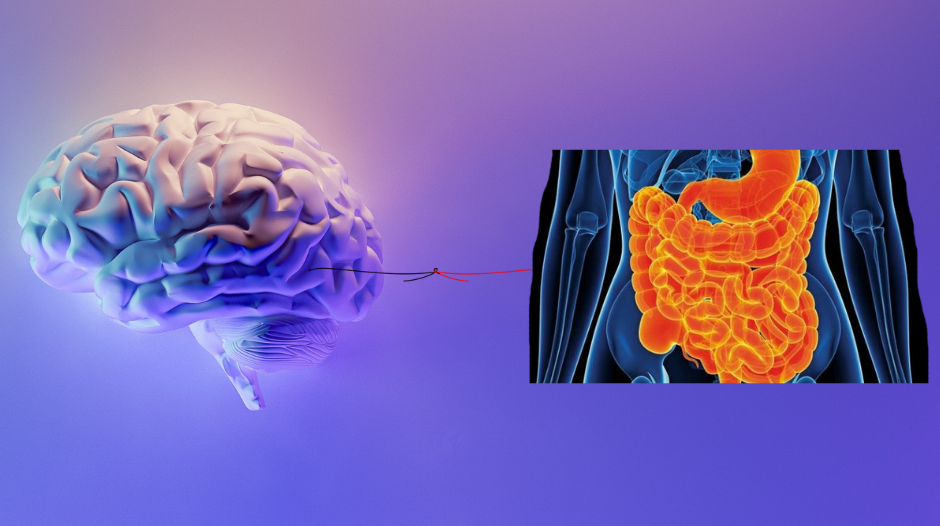Why the Mind-Gut Connection Is the Key to Solving Your IBS & Ongoing Stomach Issues
Most people are at least somewhat familiar with the concept that our bodies are integrated systems that talk with and affect one another.
However, traditional western medicine has programmed us well that when we have a physical symptom, we take a pill and it goes away.
If you have a headache, you pop an ibuprofen (Advil) or acetaminophen (Tylenol).
What’s really frustrating for my patients with IBS and ongoing stomach issues is that in most cases their problems and pain can’t be solved with a pill.
In fact, studies have shown the most common IBS pill, amitriptyline, is no more effective than a placebo.
The reason for this is the mind-body connection.
Your gut and your brain are connected in powerful ways that most people simply don’t understand. And most doctors – as much as they want to help – aren’t qualified to treat with the most effective techniques available (which have been proven by science.)
So, in this article, I’m going to show you how the mind and the gut interact to produce IBS symptoms as well as anxiety and depression.
More importantly, I’ll show you why the treatments I’ve used in my practice for 20+ years are so effective at helping my patients return to normal, healthy, and more enjoyable lives.
How Your Mind Creates Physical Reactions in Your Gut
If you’ve ever planned to go to a favorite restaurant, just thinking about your go-to meal can make you salivate. What’s more, that thought actually signals your stomach to release digestive juices before you’ve even taken a bite.1
The unique connection your brain has to your stomach creates this chain reaction.
On the flip side, if you have a big performance coming up or have to have a difficult conversation with someone, you might get “butterflies” in your stomach.
More than just a cute description for that nervous energy you’re feeling, it describes the physiological reaction your brain just triggered in your gut.
And it goes both ways.
An upset stomach can trigger anxiety and depression — conditions typically associated with the brain — and persistent worrying thoughts can throw off your digestion.
Specifically, scientists have discovered that psychological factors like depression can affect the actual movements and contractions within your gastrointestinal tract.1
The Science Behind Your Mind-Gut Connection
A major reason for this is that many key hormones and neurotransmitters like serotonin and dopamine (the ones that give you a sense of calm, happiness, and well-being) are released from the gut and send signals to the brain.
So, in a real chicken-or-the-egg dilemma…
- People with inflamed guts tend to experience more depressive and anxious symptoms, and…
- People with anxiety and depression tend to have more GI-related disorders.1
This means that issues like IBS or ongoing stomach pain that don’t have obvious physical sources, but very real physical symptoms, often have connections to mental distress.
Research has even shown that people with IBS or ongoing stomach issues “perceive pain more acutely than other people do because their brains are more responsive to pain signals from the GI tract. Stress can make the existing pain seem even worse.”1
What’s a Leaky Gut and Is It Making You Sick?
Have you heard the term “leaky gut” as a possible explanation for your IBS symptoms, but aren’t really sure what it is, or whether it’s something you need to learn or worry about?
IBS and leaky gut syndrome aren’t necessarily connected. But if you’re experiencing ongoing stomach pain, then leaky gut is something you should definitely understand and rule out as a possible cause.
So, what is it?
Well, your Gastrointestinal Tract (GI tract) which includes all the major organs from your mouth to your anus has something called microbiota. These microorganisms keep your intestinal lining strong so that bad bacteria can’t seep into your body.
Physical or mental stress, or a change in your diet, can disrupt your GI’s microbiota.
This weakens your protective intestinal lining.
When this happens, we see another mind-gut connection in action as:
- Bad bacteria can leak into your gut’s circulation and cause physical symptoms known as leaky gut syndrome.
- Anxiety and depression can be triggered as it can also impact certain brain functions.
IBS and Leaky Gut Syndrome Both Show the Power of the Mind-Body Connection
As you may know, Irritable Bowel Syndrome (IBS) is often tricky to diagnose due to hard-to-nail-down causes, but creates physical symptoms like abdominal pain, nausea, diarrhea, bloating and diarrhea, and constipation.
And while the two — leaky gut and IBS — aren’t necessarily connected to each other, they are both relevant to this discussion, because when they are present in your body, you are more likely to experience anxiety and depression.
In fact, recent research found that certain genetic markers that make someone more susceptible to IBS are also associated with mood disorders, such as anxiety and depression.
In fact, 34.3% of people in the study who had IBS had also been treated for anxiety at some point in their lives.3
These two syndromes clearly demonstrate how the mind and gut affect each other.
This is important to know so that you can better understand how your body works, and make the best possible decisions to find the most effective treatments for you.
Treating Mind-Gut Disorders Like IBS & Ongoing Stomach Pain
It makes sense that if anxiety or depression is connected to a physical part of the body and vice versa, then the treatment must address both mind and body.
Up until this point, in the larger medical community, IBS and other GI disorders have been treated medically.
And psychological issues have been treated cognitively and behaviorally (with some medical forms of treatment, depending on the severity).
They’ve mostly been kept in their individual boxes, and as a result, frequently see mediocre or poor results.
In short, separating mind and body as if they have nothing to do with each other just doesn’t work.
Taking the knowledge that we’ve gained about how the two systems are inextricably linked, we can begin to think more holistically in treating both mental and GI disorders.
When someone has depression, a mix of psychotherapy, potentially psychotropic medications, and a gut-healthy regimen of diet and supplements and stress-reduction skills training stands a better chance of relieving their symptoms than talk therapy alone.
Likewise, GI disorders can benefit from a gut-friendly protocol as well as cognitive-behavioral therapy (CBT) and medical hypnosis.
Learning how to calm your mind and body signals your parasympathetic nervous system (PSNS) to do its job of resting and digesting.
When this “resting and digesting” system is working normally, your digestion functions as it should.4
When you are out of this state, meaning you are stressed, then your sympathetic nervous system (SNS) takes over. This causes the “fight or flight” response, and your stomach lets you know with uncomfortable symptoms.
Science Backs Up Holistic Treatments
Of course, everything I do is based on science. This isn’t some “woo woo” stuff that has nothing to back it up.
Research shows that people with IBS who received cognitive behavioral talk therapy experienced positive effects on the intestinal microbiota and serotonin.5
In other words, people with ongoing stomach pain received physically measurable improved gut functioning from a treatment focused on the mind (cognitive behavioral therapy.)
Additional studies have also confirmed that implementing psychological treatment for patients with IBS or ongoing stomach pain provided them with more improved digestive symptoms as compared with medical treatment alone.
Plus, they received the benefit of less stress and lowered levels of anxiety and depression.1
Medical Hypnosis Has Been Proven 3x More Effective vs Standard Treatments
In my practice in California (I now also do telemedicine appointments in many states), I’ve used medical hypnosis for more than 20 years to treat hard-to-solve conditions like IBS and ongoing stomach pain.
Hypnosis is one of those words that tends to create skepticism, however, this isn’t mind control or anything like that. No one can ever make anyone do something they wouldn’t normally do.
Medical hypnosis — also known as clinical hypnosis, self-hypnosis, visualization, guided imagery, or mental imagery — simply involves creating a highly focused state of mind that allows you to access your internal ability to change a pattern of thinking and behaviors.
It is a learned skill that is strengthened with continued practice, and it’s been shown to be 3x more effective vs standard treatments.
I teach my patients this simple, yet highly effective technique, which helps them feel more empowered to feel better, physically and mentally, whenever they choose to implement the skill.
Cognitive Behavioral Therapy Is Also Very Effective in Treating IBS
Another tool to support the mind that has been proven to be extremely effective in treating IBS and ongoing stomach pain is cognitive-behavioral therapy (CBT), and I incorporate this with all of my patients.
Your thoughts lead to feelings, which usually lead to actions.
So, by going back to the source — the thought — and replacing a negative one with a positive one, or figuring out a new way to look at something, your feelings and behaviors will likely change as well.
This combination of treatment has proven exceptionally effective because it reduces the stress and anxiety that so often upsets the delicate gut balance, and in so doing, provides relief from any number of painful GI symptoms.
You Can Feel Better Faster Than You Might Think
Many of my patients also experience significant anxiety and depression related to their physical disorders, and this approach greatly improves their mental distress as well, without a full regimen of medications and the potential side effects or negative interactions they might cause.
My patients typically see improvement within a few sessions and feel more hopeful than they have in years of traditional treatments.
Finding lasting relief starts with the right approach to treating the whole person, mind and body, so if you or your child are suffering with a GI disorder and are interested in learning more about my approach, you can download my free guide, 3 Things You Can Do Today to Support Your Child with IBS.
If you’re ready to take this complete online program to get relief from IBS and other intestinal dysfunctions, click here to start now.
Or, if you’d like to speak to me personally, I’m certified to practice telemedicine in many states. You can click here to book a free personal consultation.
I hope this article has not only given you a better understanding of the root causes of IBS and ongoing stomach pain (and how the mind-body connection affects them), but also gives you hope that your tomorrows can be better than today.
Jeff Lazarus, MD
Jeffrey E. Lazarus, MD, FAAP is a board certified pediatrician who combines more than 25 years of general pediatrics experience with the use of medical hypnosis and visualization techniques, cognitive behavioral therapy strategies, and powerful motivational tools.





